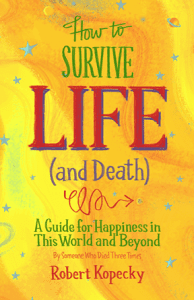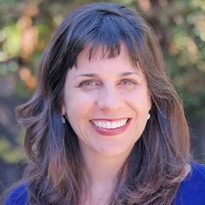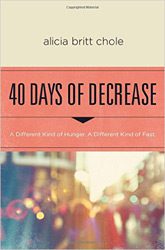 Now featured in the Patheos Book Club: How to Survive Life (And Death): A Guide for Happiness in This World and Beyond by Robert Kopecky.
Now featured in the Patheos Book Club: How to Survive Life (And Death): A Guide for Happiness in This World and Beyond by Robert Kopecky.
You claimed to have had three Near Death Experiences; were they different from each other?
Kopecky: Yes, each was entirely different from the other, but all similar to other peoples’ NDE stories that I’ve read or heard since. The first was an entirely engrossing experience that went on for what seemed like a long time. The second was like being a witness to something rather critical – scenes from my life. The last one was kind of tough, because there was almost a struggle to it that came from not wanting to leave where I was. I learned three completely different, powerful lessons from each.
Some people have very fantastic near death experiences, why doesn’t your book have anything like that?
 I believe that in the same way as this life can be experienced in entirely different ways by different people, the quality of consciousness we carry into the “afterlife” can define our experience there, too – at least while we settle in there. Without casting any doubt at all on the testimony of other survivors, I avoid the details of the circumstances I was in (that may have to do with our state of being and imaginations) in favor of focusing on the lessons I learned in each episode.
I believe that in the same way as this life can be experienced in entirely different ways by different people, the quality of consciousness we carry into the “afterlife” can define our experience there, too – at least while we settle in there. Without casting any doubt at all on the testimony of other survivors, I avoid the details of the circumstances I was in (that may have to do with our state of being and imaginations) in favor of focusing on the lessons I learned in each episode.
A lot of your book doesn’t seem to be about near death experiences or dying as much as it’s about how to live. Why is that?
Primarily, because I didn’t experience any real cessation of life, of consciousness. The transition from here to “there” was entirely seamless, so I can only conclude that dying is part of the larger experience of living. Also because the experiences I had, and the lessons that came from each, were germane to the way I had been living life. So all of it is about how we live.
What did nearly dying teach you about living?
I didn’t know that I was close to death immediately before any of my experiences. There were no terminal conditions, no long illnesses involved. This life, as we experience it in these bodies, is in itself a terminal condition, a kind of “class” in being that can end at practically any moment. Real success beyond this has more to do with how you are living, than with what you have or have done.
If death is so natural, why is it so scary?
Our egos – our interface with this life that’s available to us through the “hardware” of this physical form we’re in – are defense, survival, and procreation oriented. Formed by the basic instinct to live. So to our intellects (our egos), death seems like obliteration, loss and failure, when of course, it isn’t. It’s also our natural fear of the unknown. A big part of my message is that there’s nothing to fear.
What did your experiences teach you are the most important things in life?
Recognizing the eternal aspects of this life – and the principles and practices that can help us recognize, cultivate, and celebrate those aspects. For example, I’ve come to realize Love itself as an energetic field, of sorts, that runs beneath, and through, and arches over every moment of life; and whose absence is the cause of all needless suffering.
You have “Three Tips for Happiness” throughout your book; can you describe them?
Yes, briefly. Radical Kindness is pretty self-explanatory, and is the single most effective, transformational practice for your life. Radical Forgiveness is the absolute best means of releasing self-destructive regrets and resentments. And Radical Surrender is the completely counterintuitive key to living in the flow of life, and realizing the magic and wonder of having dreams come true. That’s it – in a nutshell.
You seem to think animals are more conscious than we usually give them credit for, what about animals and the role they play in our lives?
Animals are our channels to the Divine, and are fully participating partners in our lives’ karma lessons. They are often completely understanding of our language, motivations, and problems, but in a format we usually don’t allow ourselves to share because of obstacles created by our human ego and intellect. They often directly mirror us, personally and collectively. We could consider them to be “smarter” than us in many ways, particularly in the context of their own forms, and their wisdom of living in harmony with all of Life.
Do you believe in reincarnation?
Having inadvertently discovered the seamless nature of life, from life to life, naturally, yes. Besides, there’s too much predetermined when we enter these lives, and usually not enough resolved when we leave them to think that one life can contain the entire evolution of a spirit, back into the source of spirit.
You talk a lot about meditation in a pretty direct way. Why is that, and what tips do you have for people who have a hard time with it?
I didn’t really realize the meaning of my three NDEs until I’d had a meditation practice in my life for about six or seven years. I find that I can actually experience a glimmer of the state of being that I experienced, “peeking behind the curtain,” so to speak, when I meditate. My biggest tips are to become a witness to your thinking mind, in order to move away from it; and to keep pursuing that thought-free state until you begin to experience the unity of everything. If you keep practicing, you’ll get there.
What led you from being an illustrator/designer with a lifetime of major publication and network TV credits, to wanting to write about what would usually be considered “fringe” spiritual subject matter?
Pretty much dying three times did that for me. It became clear that I wasn’t really any of those outer lives that “ended,” or kept changing and deconstructing themselves. Plus, it gave me a purpose that commercial art couldn’t match – one that you may appreciate – and that is that you don’t have to repeat the difficulties I went through if you’re willing to take my experiences to heart. I want to help people with the hard parts of their lives.
You seem to refer to a lot of well-known spiritual teachers and leaders, swamis, physicists, even to the scriptures of different religions in your writing – where did all of that come from?
I’m almost completely self-taught in those areas, really. I don’t know exactly why, but at a certain point in my life reading or listening to anything but this kind of transformational wisdom just stopped making sense to me. So while I still draw lots of pictures, I draw more of them with words – in an effort to translate all this spiritual truth through the prism of my experiences, and relate it in a simpler, easier way, if possible.
Robert Kopecky is an Emmy-nominated art director. He designed the credits for Showtime’s Weeds and he art directs the PBS children’s show Word World. He contributes to Evolver.net, NewBuddhist.com, TheMindfulWord, and elsewhere. He lives in Brooklyn with his wife, Sue Pike, the Animal Talker (SuePikeEnergy.com). Visit him at http://RobertKopecky.blogspot.com.













